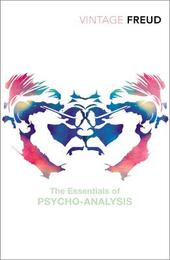
|
The Essentials of Psycho-Analysis
Paperback / softback
Main Details
| Title |
The Essentials of Psycho-Analysis
|
| Authors and Contributors |
By (author) Sigmund Freud
|
|
Introduction by Anna Freud
|
| Physical Properties |
| Format:Paperback / softback | | Pages:624 | | Dimensions(mm): Height 198,Width 129 |
|
| Category/Genre | Popular psychology |
|---|
| ISBN/Barcode |
9780099483649
|
| Classifications | Dewey:150.1952 |
|---|
| Audience | | Tertiary Education (US: College) | | Professional & Vocational | |
|---|
|
Publishing Details |
| Publisher |
Vintage Publishing
|
| Imprint |
Vintage Classics
|
| Publication Date |
2 June 2005 |
| Publication Country |
United Kingdom
|
Description
In this selection of her father's writings Anna Freud has defined and included, in a single volume, the essential, irreducible elements of psycho-analysis. She begins with the most appropriate of Freud's own introductory essays, The Question of Lay Analysis, and follows the sequence of themes that he adopted in that work: The meaning of dreams, the concept of the unconscious, instinctual and sexual life, the structure of the personality, defence mechanisms and symptom-formation. The result, with her own lucid commentaries supplementing her father's writing in the authorised translations by James Strachey, is a coherent, manageable and authoritative guide to the principal themes and concepts of psycho-analysis.
Author Biography
Sigmund Freud (1856-1939) was born in Moravia; between the ages of four and eighty-two his home was in Vienna- in 1938 Hitler's invasion of Austria forced him to seek asylum in London, where he died in the following year. His career began with several years of brilliant work on the anatomy and physiology of the nervous system. He was almost thirty when, after a period of study under Charcot in Paris, his interests first turned to psychology, and another ten years of clinical work in Vienna (at first in collaboration with Breuer, an older colleague) saw the birth of his creation, psychoanalysis. Freud's life was uneventful, but his ideas have shaped not only many specialist disciplines, but the whole intellectual climate of the twentieth century. Anna Freud (1895-1982), the youngest daughter of Sigmund Freud, not only became a leading authority on child analysis, in both its theoretical and clinical aspects, but also a principle exponent of her father's work. During her lifetime she gained a worldwide reputation for her scientific leadership in the continuing exploration and extension of his discoveries.
ReviewsHe was possessed of exceptional literary gifts. There can be no question that he was a great writer: to read him is to be beguiled by him... his influence on all of us was enormous, and it would be as impossible to return to a pre-Freudian way of thinking as to return to a pre-heliocentric theory of the solar system * The Times * The great founder of psychoanalysis * The Times *
|